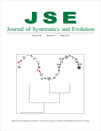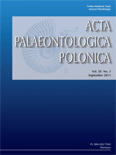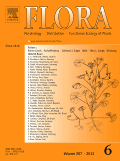
JOURNAL OF MAMMALIAN EVOLUTION
metrics 2024
Connecting Research and Discovery in Mammalogy
Introduction
JOURNAL OF MAMMALIAN EVOLUTION, published by SPRINGER, stands at the forefront of the field of mammalian evolutionary research since its inception in 1993. Renowned for its scholarly rigor, this journal covers an extensive range of topics within ecology, evolution, behavior, and systematics, achieving a prestigious Q1 rank in its category, according to the latest metrics. With an ISSN of 1064-7554 and E-ISSN of 1573-7055, it offers critical insights into the diverse adaptations and evolutionary processes of mammals, making it an invaluable resource for researchers, professionals, and students alike. The journal maintains a significant impact factor, reflecting its relevance in shaping current discourse and discoveries within the biological sciences, particularly in mammalogy. Access to its rich repository of articles aids in fostering scientific collaborations and advancing knowledge in the evolutionary sciences, thus solidifying its role as a critical platform for cutting-edge research.
Metrics 2024
 0.74
0.74 1.60
1.60 2.00
2.00 55
55Metrics History
Rank 2024
Scopus
IF (Web Of Science)
JCI (Web Of Science)
Quartile History
Similar Journals

ANNALES ZOOLOGICI FENNICI
Celebrating Four Decades of Zoological ExcellenceANNALES ZOOLOGICI FENNICI, published by the Finnish Zoological Botanical Publishing Board, is a prominent scientific journal dedicated to advancing the fields of Animal Science, Zoology, Ecology, Evolution, Behavior, and Systematics. Based in Finland and serving an international audience, this journal has been an essential resource since its inception in 1974, offering valuable insights into biodiversity, conservation, and ecological dynamics. While it holds a respectable Q3 quartile ranking across several relevant categories in 2023, its impactful contributions to the scientific community continue to promote critical discussions and foster research collaborations. Although the journal is not currently open access, its robust indexing in Scopus and recognition within the academic community underscore its significance. As a researcher, professional, or student, engaging with the ANNALES ZOOLOGICI FENNICI not only enriches your knowledge but also aligns you with the forefront of zoological research and conservation studies.

RUSSIAN JOURNAL OF THERIOLOGY
Pioneering Research in Ecology and SystematicsRUSSIAN JOURNAL OF THERIOLOGY is a prominent academic journal published by KMK SCIENTIFIC PRESS LTD in collaboration with the esteemed Moscow State University. As a dedicated platform for researchers in the fields of Animal Science and Zoology, Ecology, Evolution, Behavior and Systematics, and Plant Science, this journal strives to advance our understanding of terrestrial ecosystems and their inhabitants. Although it currently holds a Q4 ranking and ranks within the lower percentiles of its respective categories, the journal's consistent publishing output since 2011 showcases a commitment to facilitating scientific discourse and collaboration. Addressed to a diverse audience of researchers, professionals, and students, RUSSIAN JOURNAL OF THERIOLOGY serves as an essential resource for disseminating valuable insights and fostering future advancements in the biological sciences.

Journal of Systematics and Evolution
Connecting Researchers Through Open Access ScienceThe Journal of Systematics and Evolution, published by WILEY, is a premier academic journal dedicated to advancing the fields of Ecology, Evolution, Behavior, and Systematics and Plant Science. With a distinguished Q1 ranking in both of these critical categories in 2023, it stands at the forefront of scientific research, placing it in the top quartile among its peers. Featuring both an ISSN of 1674-4918 and an E-ISSN of 1759-6831, the journal has been converging innovative research since its inception in 2008. The journal caters to a global audience of researchers, professionals, and students, providing a platform for disseminating significant findings and fostering academic dialogue. Its impressive Scopus rankings further affirm its impact, coming in at Rank #62/721 in Ecology and Rank #48/516 in Plant Science, highlighting its relevance and influence in these vibrant fields. As an open-access journal, it ensures that groundbreaking research is accessible to all, thus enhancing collaborative opportunities within the scientific community.

ORGANISMS DIVERSITY & EVOLUTION
Unveiling Nature's Complexity: A Journal of Discovery and DialogueOrganisms Diversity & Evolution is a premier academic journal published by Springer Heidelberg, dedicated to advancing the fields of ecology, evolution, behavior, and systematics. Established in 2001 and continuing through 2024, this journal plays a crucial role in disseminating high-quality research that explores the complexities of biological diversity and evolutionary processes. With a commendable 2023 Scopus ranking of #253/721 in its category, placing it in the 64th percentile, and categorized in the Q2 quartile for Ecology and Evolution, it consistently attracts contributions from leading scientists and researchers worldwide. Although it operates on a subscription basis, the journal's rigorous peer-review process and dedication to impactful scientific discourse make it an invaluable resource for academics, practitioners, and students keen on understanding the intricate relationships that shape our biodiversity. By highlighting innovative research and fostering discussions on urgent ecological challenges, Organisms Diversity & Evolution serves as a vital platform for those committed to conservation and evolutionary biology.

PalZ
Connecting the Dots of Ancient LifePalZ is a prestigious academic journal in the field of Paleontology, published by Springer Heidelberg in Germany. With a long-standing history that traces back to its converged years from 1914 to 2024, this journal offers invaluable insights into the evolutionary dynamics and ecological relationships of past life forms. Holding a commendable impact factor and ranked in the Q2 category of Paleontology, it consistently showcases high-quality research that resonates within the scientific community, evidenced by its Scopus rank of #38 out of 113 in Earth and Planetary Sciences. PalZ is committed to open access, ensuring that its rich repository of scholarly articles is readily accessible for researchers, professionals, and students alike. By engaging with the journal, readers will encounter cutting-edge studies that are pivotal for advancing our understanding of paleobiology and the historical patterns of biodiversity.

Annual Review of Ecology Evolution and Systematics
Unveiling Insights into Ecology and Evolutionary BiologyThe Annual Review of Ecology, Evolution, and Systematics, published by Annual Reviews, is a leading academic journal dedicated to advancing the understanding of ecological and evolutionary processes. With a commendable impact factor and impressive rankings—9th in both the Ecology, Evolution, Behavior and Systematics category and the Environmental Science category—this journal is recognized for its rigorous peer-reviewed articles that synthesize research findings across a wide range of topics within the fields of ecology and evolutionary biology. Established in 2003, this annual publication aims to provide researchers, professionals, and students with comprehensive insights into the latest developments and trends within these dynamic disciplines. By facilitating access to high-quality scholarly articles, the Annual Review of Ecology, Evolution, and Systematics continues to play a crucial role in fostering scientific discourse and discovery.

ACTA ENTOMOLOGICA MUSEI NATIONALIS PRAGAE
Charting New Territories in Ecology and EvolutionACTA ENTOMOLOGICA MUSEI NATIONALIS PRAGAE, published by the esteemed NARODNI MUZEUM - PRIRODOVECKE MUZEUM in the Czech Republic, is an influential journal in the fields of Ecology, Evolution, Behavior and Systematics, as well as Insect Science. With an ISSN of 0374-1036 and an E-ISSN of 1804-6487, this journal has established itself as a vital resource for researchers, professionals, and students interested in the intricate world of entomology. Spanning publications from 2005 to 2024, it is recognized for its contributions to the understanding of insect biology, offering insights on ecological interactions and evolutionary relationships. Although it operates as a subscription-based platform, the journal maintains a respectable presence in scholarly circles, positioned in the Q2 quartile for both relevant categories in 2023. ACTA ENTOMOLOGICA serves not only as a repository of significant empirical findings but also as a discourse platform for emerging entomological concepts, making it an essential read for those involved in the biological sciences.

ACTA PALAEONTOLOGICA POLONICA
Unveiling the Mysteries of Life Through FossilsACTA PALAEONTOLOGICA POLONICA is a leading scholarly journal in the field of paleontology, published by the Institute of Paleobiology, Polish Academy of Sciences. With its open access model established since 1956, the journal ensures that vital research related to Earth's history and the evolution of life is freely accessible to a global audience. Based in Warsaw, Poland, this journal has garnered a respectable impact within the academic community, currently positioned in the Q2 quartile of its field and ranking #47 out of 113 in Scopus for Earth and Planetary Sciences, reflecting its significance in advancing paleontological research. Covering a wide range of topics related to fossil studies and evolutionary biology, ACTA PALAEONTOLOGICA POLONICA serves as a crucial platform for researchers, professionals, and students alike, encouraging the dissemination of innovative ideas and discussions that contribute to our understanding of past life on Earth. As it continues to publish high-quality articles through to 2024 and beyond, this journal remains integral to the ongoing discourse in paleontological sciences.

PALAEONTOGRAPHICA ABTEILUNG A-PALAOZOOLOGIE-STRATIGRAPHIE
Empowering Research: A Beacon for Paleontologists and StratigraphersPalaeontographica Abteilung A-Palaozoologie-Stratigraphie is a prominent academic journal that serves as a vital resource for researchers in the fields of Paleontology and Stratigraphy. Published by E Schweizerbart'sche Verlagsbuchhandlung in Germany, this journal has been instrumental in disseminating cutting-edge research from 1996 to 2024. With an established reputation highlighted by its Q3 ranking in both Paleontology and Stratigraphy, it ranks 26th among 113 journals in Paleontology and 15th among 55 in Stratigraphy, showcasing its significance within the scientific community. Although it does not currently offer open access, the journal provides an invaluable platform for the exchange of innovative ideas and findings in paleobiological and stratigraphic studies. As such, Palaeontographica continues to attract contributions from leading academics, making it an indispensable publication for professionals and students alike who are eager to advance their understanding of Earth's historical biological and geological patterns.

FLORA
Advancing Knowledge in Evolutionary BiologyFLORA is a distinguished journal published by Elsevier GmbH, focusing on the realms of Ecology, Plant Science, and Evolutionary Biology. Established in 1975, this journal has been a vital platform for researchers and professionals, disseminating groundbreaking findings and insights relevant to the plant sciences. With an impressive impact factor and a current Scopus ranking placing it in the second quartile (Q2) across multiple categories, FLORA is recognized as a critical resource for advancing knowledge in its respective fields. The journal publishes both traditional research articles and significant review papers, ensuring a broad spectrum of academic engagement. Although not open access, FLORA remains committed to enhancing the scientific discourse and fostering collaboration among scholars worldwide. Researchers seeking to enrich their understanding of ecological dynamics and plant biology will find FLORA to be an essential addition to their academic repertoire.